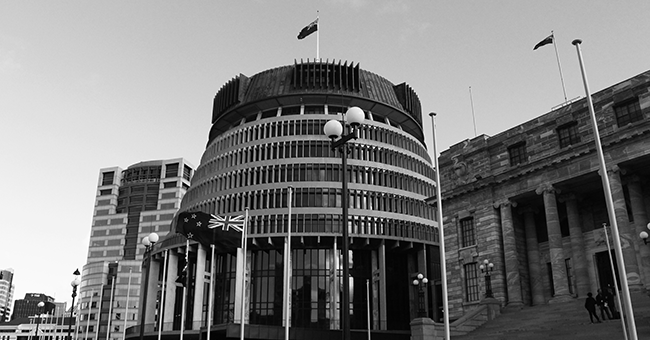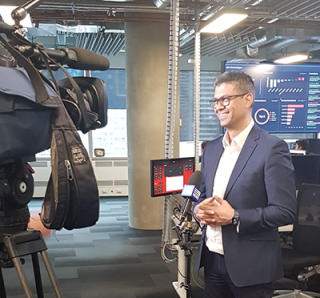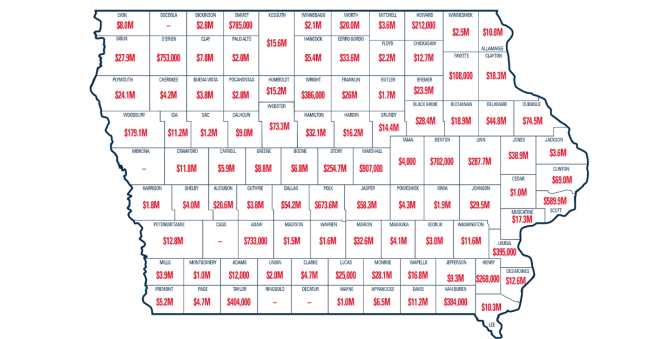TOM ELLIOTT: All right, well as we know the economy has taken a massive hit the past couple of months. We’ve got a lot of people employed, a lot of businesses that aren’t making any money whatsoever. They’ve pretty much shut their door. Yes, we have the JobKeeper allowance. But it’s not really the same as working for a wage because it’s the federal government just giving people money in order to keep them connected with their businesses. And as you’d expect, spending levels in the economy have dropped off dramatically. Car sales have dropped off. House sales have also dropped enormously. And you’ve got to wonder, you know, where are we headed?
TOM ELLIOTT: Is it possible that we can just hibernate for another month or so as the state government wants us to do, and then, you know, burst out a bit like a bear in springtime and you know, go and hunt and eat things and whatever? Or are we set for a generational recession? Our next guest knows probably more about people’s spending habits collectively than we all do ourselves. He’s the CEO of the ANZ Bank. Shayne Elliott, good afternoon.
SHAYNE ELLIOTT: Good afternoon.
TOM ELLIOTT: My major credit card is with you guys and that’s where I do all my day-to-day transactions. I’m sure I’m one of several million customers who are like that at the ANZ. What are you seeing? Has people’s spending dropped off a cliff?
SHAYNE ELLIOTT: It’s dropped off. I’m not sure it’s dropped off a cliff. It’s certainly changed. And so, in certain categories it’s absolutely dropped off a cliff, as you can imagine, the obvious ones, things like travel and restaurants and all of that stuff. But then in other areas it’s gone up, so a lot more online activity and a lot more other stuff … and we saw that big boost even in groceries as people stockpiling. So it’s really changed Tom. So, yes it’s fallen but the nature of spend has changed quite dramatically.
TOM ELLIOTT: What about people’s borrowings? Are people extending their borrowings during this time? Or are they diverting their cash reserves to reduce their borrowings? What’s happening?
SHAYNE ELLIOTT: A really good question. Actually, that’s really interesting. Now, let’s remember that the banks, including ANZ, have generally been … we’ve been giving people a payment holiday, say, look, if you don’t want to have to pay your home loan for the next six months, or if you’re a small business you don’t need to. Actually, people are behaving really, really responsibly. So we’re not seeing a lot of people asking to borrow more. Absolutely, people are saying, “hey look, I just want to pause on repayment until I get myself together and I’ve got greater certainty about my job”. But no, we’re not really seeing a big request to borrow more. In fact, particularly small businesses. And I think small businesses are not silly. They know that times are tough. The last thing you want to be doing is just racking up debt. So they’re doing what they can without the need to borrow more. And so, no, there’s not really been a big surge in terms of borrowing from either small businesses or, frankly from households.
TOM ELLIOTT: The federal government has used the term hibernation quite often in the past eight weeks. So this idea that businesses can sort of, shut down for a while and then just re-emerge from their caves, like a North American bear in the spring. Do you think that’s possible? Because what I worry about is that some businesses that shut their doors are pretty much gone for good.
SHAYNE ELLIOTT: I think sadly, that will be the case. There will be some that, particularly those that were probably struggling anyway. I mean, it wasn’t all a bed of roses before COVID-19, not for every industry. There are already some struggling. And obviously we had the bushfires and people seem to have forgotten all of that stuff. So there was already some stress in certain parts of the economy anyway. So some won’t. I think the other thing that’ll happen Tom, is I imagine like in anything like this, it sort of scares people a little bit. Right? So people who will go back, even if they open up their restaurant or their business or whatever it is, they’re probably going to be quite cautious. So, hey I used to run my shop, maybe I had, you know, eight staff. Maybe I’ll open up and I’ll just try and make do with four or so. I just think people are going to be really cautious. I do not believe, now there’ll always be exceptions, but I don’t believe en masse everything will bounce back to the way it was.
TOM ELLIOTT: How important is the Government’s JobKeeper scheme, the scheme that, you know, pays people the equivalent of almost 40,000 bucks a year for six months to try and keep employees and their businesses connected?
SHAYNE ELLIOTT: It’s absolutely massive. I mean, we would be in a much worse position without it. I mean, we can see the data. I can … when this sort of crisis really hit the economic shores, if you will, of Australia, when it really started to take a bite. And, this is before JobKeeper, the banks came out and said, “look, we can give you time, we can give you time off from payment”. I mean, we got flooded with requests. As you can imagine, quite sensibly, people were scared. People were worried about losing their job or income. And so, you know, hey they reach for a lifeline. And we were proud to be able to do that for people. And then after that, about – I’m trying to remember now – but a couple of weeks after that, or maybe 10 days, that’s when JobKeeper was announced. As soon as it was announced, you could see the pressure come off people and our applications for deferrals just collapsed. Now there’s still some coming through, but generally, putting a bit of money into people’s pockets has been an enormous saving grace to this. And there’ll always … you can always criticise in hindsight and say “maybe it wasn’t as targeted as it should have been. Maybe some people got it that didn’t deserve it,” and all that other stuff. But actually, you’d have to say it was 99 percent the right, absolutely the right thing to do and it’s been very effective.
TOM ELLIOTT: What about the unemployment rate? Now overnight in America, we had some figures out which really looked quite catastrophic. You know, unemployment’s gone from a bit over 4 per cent to almost 15 per cent, 20 million new Americans out of work. Are we headed for a similar number here in Australia?
SHAYNE ELLIOTT: We don’t think so. Now, our view is that we’ll probably … the next number that comes out – remember, we were sitting at around the five percent number, a little over – probably be closer to eight. And we think it will peak, probably below 10. You know, before JobKeeper … before that happened, we were expecting it to actually even get to 13 per cent. But now, maybe it’s going to be more like 10. But look, it’s still a lot, right? It’s still a, it’s a dreadful outcome for so many people. So it’s a significant increase. Now, we think that’s going to happen now. The good news is, as we’re starting even today, we’re starting to see signs of the states allowing businesses to open. Obviously, it’s going to be slow and staggered, but that all, I think that’s probably a little bit faster than we might have thought a few weeks ago. So that’s giving a little bit more confidence that maybe people can get back on their feet and back into work a little bit faster than we might have imagined. But certainly not the numbers that we’re seeing in the United States.
TOM ELLIOTT: I mean, you’re a national bank, but you’re based here in Melbourne. The Victorian government appears to have perhaps the strictest set of lockdown rules in place, compared to every other state in Australia. Is it doing the right thing compared to those other states?
SHAYNE ELLIOTT: They’ve got the data that I don’t have. And … we know that the … Victoria has suffered probably a little bit more than certainly many of the other states. So look, I don’t have access to that data, but I think being cautious is understandable given we have seen some evidence internationally, of when economies have opened up, most notably in Korea and even in Germany. There’s been the need to sort of go back into some form of lockdown pretty quickly. So I can understand that. Let’s hope it’s not for too long though. And I think the good news here is, we’re moving in the right direction.
TOM ELLIOTT: Can I ask you, when you, when you’re assessing people’s loans at the moment. There was another bank last week, a smaller union-run bank called ME Bank, that sort of unilaterally just went and pulled back people’s lines of credit, then they’ve had to back down on that. But I mean, are you looking, even for people that have jobs, at the risk of their, of the industry in which they work? I mean, for example, I work in media. A lot of people think that traditional media is in trouble, which it probably is. Would you, would you look at, not just what I earn, but the industry that I’m in now when assessing me for a loan?
SHAYNE ELLIOTT: We do, but not probably as seriously as you might think. So we don’t make those sorts of judgments, to be honest. The reality is that even in that dire situation that we talked about, 90 per cent of Australians who want to work, will have a job, and that’s pretty good. And so, no, we don’t make judgments based on what you do. We do look at a range of indicators about, hey, how long have you been in the job? What kind of income do you have? What are your other circumstances and savings. But no, we don’t make judgments and sit here and say, “oh, look, you know, you’re a tradie, you’ve got, your job’s more secure than if you’re in media or if you’re in the mining industry. No, we don’t, we don’t really do that.
TOM ELLIOTT: Final question. A lot of shareholders own your shares because they expect a twice yearly dividend. A fortnight ago, you had to suspend that dividend. Is it coming back?
SHAYNE ELLIOTT: It’ll be back. And it’s just a question of timing. What we did is, we suspended a decision. And what we said is, it’s just a complete accident of history that we make dividend payments twice a year, and one of them happens to be an announcement in April. And that just happened to coincide with the single biggest economic crisis that we’ve experienced as a country, literally in 100 years. I mean, it just felt like incredibly imprudent to make a decision at that time when we don’t need to. Now, we know that a lot of people depend on that dividend. I understand that. Our board understands that. But we said, we’ve got to buy a bit of time here because, once we pay that dividend, we write that cheque, it’s really hard to get that money back. And if the bank needed it because times look worse than we thought. We didn’t want to be in that position. So we bought a bit of time. Remember, a bank board can make a decision on a dividend literally at any time. What we did is we said, we need a bit more information. We’re right in the eye of a storm. Let’s wait, let’s see and we’ve promised that we’ll come back with a decision by August. And that might seem a long way away, but the world’s changing literally as we speak. And, we think it’s better to do that in a calmer time when we’ve got more information at our fingertips. That’s in everybody’s interests, including our shareholders.
TOM ELLIOTT: Shayne Elliott, CEO of the ANZ Bank. Thanks for your time.
SHAYNE ELLIOTT: Thank you.








